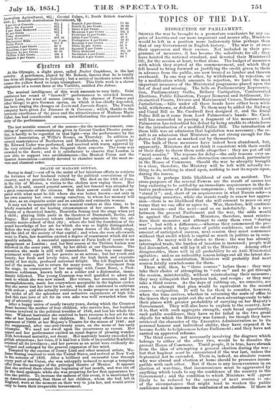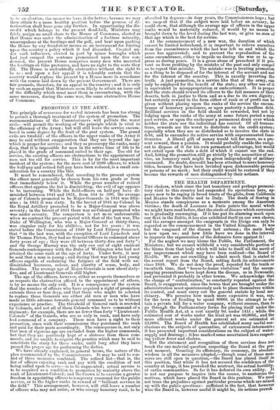TOPICS OF THE DIY.
DISSOLUTION OF PARLIAMENT.
SHOULD the war be brought to a premature conclusion by any ca- price of Austria and our more important and nearer ally, Ministers would be left in a position more ludicrously false perhaps than that of any Government in English history. The war is at once their oppression and their excuse. Not included in their pro- gramme of measures, it has become the substitute for all ; they have hoisted the national standard, and devoted their Ministerial life, for the session at least, to that alone. The budget of measures with which they started at the commencement, and which they felt bound to bring forward as justifying the credit given to them in advance from the public, are now treated as lumber and thrown overboard. In one way or other, by withdrawal, by rejection, or by a modification which amounts to rejection, we have the most important measures of the Ministerial programme placed upon the list of dead and missing. The bills on Parliamentary Representa- tion, Parliamentary Oaths, Bribery Castigation, Controverted Elections, Public Education, Pauper Removal and Settlement, Ec- clesiastical Courts, Divorce and M atrimonial Causes, Testamentary Jurisdiction,—bills under all these heads have either been with- held, withdrawn, or defeated. To them may be added the Railway and Canal Bill as Mr. Cardwell first designed it, and the Rural Police Bill as it came from Lord Palmerston's hands : Mr. Card- well has succeeded in passing a fragment of his measure; Lord Palmerston has redoubled his defeat by being unable to obtain leave for the introduction of a modified Police Bill. The introduction of these bills was an admission that legislation was necessary ; the re- sult is an admission that Ministers are not strong enough for the duties of their post as marked out by themselves.
The bulk of these measures have indeed been abandoned, but, apparently, Ministers did not think it consistent with their credit or their duty to throw them aside altogether : they are put off till "next session." The reasons for delay—the only reasons ever as- signed—are the war, and the obstruction encountered, particularly in the House of Commons. Should the war be abruptly brought to a close, therefore, the Ministry will be left with actually no- thing to do, nothing to stand upon, nothing to rest its repute upon, during the recess.
There is perhaps little likelihood of such an accident. The cross-purposes of the several Powers are the result of causes too long enduring to be settled by an immediate acquiescence in the de- lusive professions of a Russian compromise; the country could not "stand it "; and, short of an acquiescence in what Russia asks—a negotiating armistice, while she stands ready to renew her aggres- sion—there is no likelihood that she will consent to peace on any terms that we can offer or agree to. War, therefore, will continue next session—and the next—and so on indefinitely. In a race between the present Parliament and the war, the odds would be against the Parliament. Ministers, therefore, must reintro- duce their measures and attempt to carry them even "during war "; but with a difference,—whereas they commenced the pre- sent session with a large share of public confidence, and no small amount of anticipated success, next session they must commence without that credit which is capital as much in politics as in eom- merce. No mercy will be shown to them : the war has already interrupted trade, the burden of taxation is increased; people will feel discomfort, and will lay it all to the Ministry. Among other disagreeables, there will in all probability be an Anti-Ministerial agitation; and as an unhealthy season brings out all the latent dis- eases of a weak constitution, Ministers will probably find next session fatally unwholesome for them.
There will, then, be "three courses" before them : they may take their choice of attempting to "rub on" and to get through the session, ministerially, without reintroducing their measures ; they may relinquish that hopeless task, and resign; or they may take a third course. As the days of rubbing on, we conceive, are over, to attempt that plan would be equivalent to the second course--resignation. It will be for them to consider, however, when the time arrives, whether in returning the seals of office to the Queen they can point out the set of men advantageously to take their places with greater probability of carrying on her Majesty's Government. They will also have to explain to the country, how
it is, that with such aggregate strength, such broad opportunity, such public confidence, they have so far failed in the two great objects for which the Ministry was formed ; for though they have retrieved the character of the Executive Administration as to its personal honour and individual ability, they have exposed it to become feeble to helplessness before Parliament; and they have not carried on approved reforms.
The third course, not necessarily involving the disgrace which
belongs to either of the other two, would be to dissolve the present House of Commons. Timid people, it is true, have shrunk from the idea of attempting a general election during the war ; but that bugbear must be encountered if the war last, unless the Septennial Act be extended. There is, indeed, no absolute reason why war abroad and election at home should be processes incom- patible with each other. But if there is any inconvenience in an election at war-time, that inconvenience must be aggravated by anything which tends to sap the confidence of the country in the Government ; and the condition to which Ministers will ppear likely to be reduced by the opening of next session is one of the circumstances that might tend to weaken the public confidence and to increase the confusion of an election. If there is
to be an election, the sooner we have it the better ; because we may then attain to a more healthy position before the process of de- terioration shall have gone any further. In apportioning the dis- credit which belongs to the present dead-lock, Ministers may fairly assign no small share to the House of Commons, elected as that House was under the administration of a factious minority, unscrupulous at the hustings and the poll, and bent upon packing the House by any fraudulent means as an instrument for foisting upon the country a policy which it had discarded. Created un- der such influences, elected in part by minor boroughs which had just escaped the sentence pronounced upon the five con- demned, the present House comprises many men who mounted the hustings on false pretences, and have no right to the seats they fill. The House is undoubtedly obstructive without the right to be 'so ; and upon a fair appeal it is tolerably certain that the country would replace the present by a House more in accordance with the course laid down by the present Government. There are fair grounds, therefore, for an appeal to the country ; and it is only by such an appeal that Ministers seem likely to attain an issue out of the difficulty which must meet them in encountering, with the same measures, during the same war, the same obstructive House of Commons.



























 Previous page
Previous page